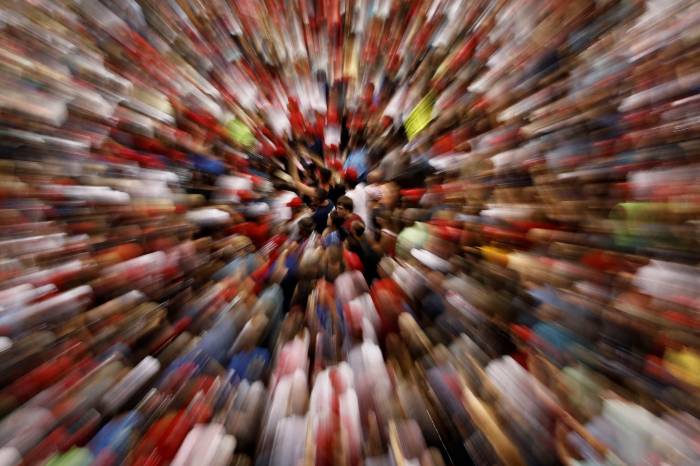It might have been destined to stay as an underground conspiracy theory. But it has quickly taken root both online and off – becoming a feature of Trump rallies and being shared by some of the most important people in the media.
It is undeniably dark: it accuses some of the most powerful people in the world of some of the most heinous crimes. And it remains mostly mysterious.
Who is Q?
Q is, well, anon. Nobody knows who they are, or why they are posting what they do.
They are, among other things, a user on 4chan. They use that forum to post a whole load of cryptic messages, which make reference to the vast conspiracy theory that has become known as QAnon.
Someties, the posts are like puzzles, offerings hints and encouraging the people reading them to get involved. Others are more explicit, making allegations about specific people and in detail.
And they do appear to be a "they". Q refers to themselves as "we", apparently at least trying to suggest that it is a group rather than just one person.
The name appears to be a reference to the fact that the person claims to have "Q" clearance, a designation in the US Department of Energy that would allow the holder access to classified material.
For now, the identity or identities behind the conspiracy theory remains secret, and it's possible it will always remain that way. While there is sometimes a specific focus on certain issues – such as the bureaucracy of the US government, and how it is trying to foil Donald Trump – it's impossible to know whether the real people behind Q actually have any experience of it.
What do they claim?
The posts tend to focus on the president and the things going on around him. Q appears to be a Trump supporter, and many of the posts complain about the fact the "deep state" is blighting his work.
But they spread out in to a vast conspiracy theory, which links up to people including Hillary Clinton and Robert Mueller, who is running the investigation into Russian interference in the election. It borrows from other conspiracy theories – such as Pizzagate, which accused a variety of well-known people of running a paedophile ring, and the long-running false claims about the death of Seth Rich – and adds yet more on top.
Q has posted that Special Counsel Robert Mueller isn't investigating Trump at all — he's really investigating Hillary Clinton, John Podesta and Barack Obama. Other theories involve familiar players in conspiracy theories such as the Freemasons and the Illuminati, while others mention The Titanic, pedophile rings in Hollywood, and the possibility that former Hillary Clinton aide Huma Abedin wears an ankle monitor. Filmmaker Francis Ford Coppola, the Rothschild family and Satan also make appearances in discussions.
Sometimes the posts are cryptic, throwing the bakers into a frenzy of riddle solving, such as:
—27-1—yes—USA94-2
—27-1—yes—USA58-A
—27-1—yes—USA04
—Conf—BECZ—y056-(3)—y
The—Castle—Runs—RED—yes
Where did all of this come from?
The theory began in October 2017, with an ominous post on 4chan titled "Calm Before the Storm" and written by someone using the name "Q Clearance Patriot".
And where is it now?
The theory has grown and flourished, breaking out into the mainstream. It has been supported by celebrities and its followers have made appearances in real life at Trump rallies.
It also seems to be taking hold on more traditional platforms. This week, for instance, it emerged that for a brief time searching on YouTube for Tom Hanks would bring up false claims that he is a paedophile, which was linked to the QAnon theory.
Tens of thousands of people actively follow along on devoted subreddits and Twitter accounts. Many more have no doubt come into contact with the theory.
Do people believe this?
In short, yes. Probably not very many of them – but those people who do believe it seem to believe in it very fiercely.
And some of its followers are very famous indeed. The actress Roseanne Barr might even have been fired because of ideas that began with QAnon.
She has tweeted about Q and retweeted posts from the "QAnon" account. In Nov. 2017, she tweeted "Who is Q?" and reportedly asked Q to direct message her. In May, Barr posted a racist tweet about former White House adviser Valerie Jarrett, who figures in some QAnon conspiracy theories. In response, ABC cancelled her hit TV show.
Why does it matter?
The allegations are damaging and dangerous, there's no doubt. But there are plenty of damaging and dangerous accusations floating around the internet, many of which go unremarked upon.
QAnon is more dangerous for a couple of important reasons: the very damaging allegations that it makes are being broadcast to many people, many of whom might not realise they are fake; and because it bears many similarities to Pizzagate, which ended in real violence when a person entered a pizza restaurant carrying a gun.
The Independent
More about: QAnon
















































